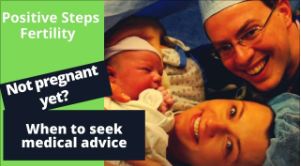“Am I doing something wrong?”
It’s a question we get asked quite often at Positive Steps: “Could I be hindering my own fertility?” The answer is complicated because while there are factors that you can control with fertility, there are many aspects that are beyond your control.
Fertility medicine isn’t always an exact science, which is why there is so much misinformation about it. In fact, there are a variety of practices people believe enhance your chances of getting pregnant. Men are told to wear boxers instead of briefs, for instance, on the supposition that boxers offer blood flow and breathing room. Women are encouraged to eat pineapple core, take Geritol, and hold their hips in the air for 15 minutes after intercourse.
While doing these things could increase your chances of conception, there isn’t enough scientific evidence to prove they actually work. Plenty of women eat pineapple core and never end up getting pregnant.
The same goes for lifestyle behaviors that can cause fertility problems. The inability to conceive is based on factors that are usually out of your control. Having blocked fallopian tubes isn’t really your fault, for example. But more about that later.
What increases the risk of infertility?
Research has shown that there are several lifestyle choices that could negatively impact fertility.
Smoking, or excessive alcohol or drug use is one behavior. Again, though, the research is far from definitive. Plenty of women smoke on a daily basis, for example, and still manage to get pregnant.
Nonetheless, it’s true that cigarettes, drugs, and alcohol all contain certain chemical additives that can detrimentally impact the reproductive system. For that reason alone, it’s best that anyone trying to conceive set these things aside. In any case, no one should be engaging in such risky behaviors as these during pregnancy given the serious impact they can have on the health of a developing baby.
Another potential hindrance to fertility is body weight. Research from The American College of Obstetricians and Gynecologists (ACOG) has shown that it is possible to have too much – or too little – of it to carry a successful pregnancy to term. For women, the ideal body mass index (BMI) ranges from 18.5 to 24.9. These numbers represent the range you should fall within in order to achieve optimal fertility results.
Though, plenty of women outside of the BMI range still manage to get pregnant and deliver healthy babies. The effect of body weight on pregnancy is often a subtle one that’s difficult to quantify.
Exercising too much could also increase the risk of infertility. Studies from ACOG reveal that while 30-60 minutes of exercise a day can decrease the risk of ovulatory-factor infertility, exercising for longer than an hour may reverse the positive effects of exercise and actually increase infertility risk.
Even psychological and emotional stress has been linked to an increased risk of infertility. Assessing your mental health is crucial for many reasons, but research indicates that while it’s not a sole contributor to infertility, untreated anxiety and depression can hinder or delay a woman’s ability to become pregnant.
Clearly, there are practical steps that you can take to reduce infertility risk, whether it be eating healthier, seeking mental health care, or exercising the proper amount of time.
What medical conditions can affect fertility?
Most of the factors that impede fertility, however, are completely beyond your control. Having Polycystic ovarian syndrome (PCOS) isn’t something that can be said to be your “fault”, for instance. Rather, PCOS is often caused by shifts in hormones such as LH (luteinizing hormone from the brain), testosterone (from the ovary and fat), DHEA, or dehydroepiandrosterone, (from the adrenals), and the interplay of insulin and body fat.
Growing older is a reality no one can control, and yet age factors into the complicated equation of fertility. Research indicates that women over 40 have a much harder time getting pregnant than younger women do. However, there are plenty of women over 40 who have beaten those odds as well.
There are a whole variety of fertility conditions that cannot be reversed by lifestyle changes alone. Some examples include:
- Polycystic ovarian syndrome
- Blocked fallopian tubes
- Low sperm count
- Erectile dysfunction
- Low ovarian reserve (too few eggs)
- Tissue scarring in the uterus or elsewhere
- Polyps and fibroids
Conditions like these require medical intervention or they will only persist – and maybe even worsen. Healthy living by itself can’t resolve any of these problems. All the exercise in the world won’t un-scar your uterine tissue, and neither will eating pineapple core or taking a daily Geritol.
For example, low ovarian reserve, a condition which typically occurs in women who are in later stages of reproductive aging, is not something you can address yourself. Women with this condition need the expertise of a medical professional in order to come up with a proper treatment plan.
A fertility specialist might recommend in vitro fertilization, for instance, to combat the effects of low ovarian reserve. But even this method is dependent upon each patient’s circumstances, which is why seeking medical help is the best way to combat infertility in women. And the same goes for fighting infertility in men for things like erectile dysfunction or a low sperm count.
When should you seek infertility treatment?
If you’ve been trying to get pregnant for a year or more with no success, it’s probably time to see a fertility specialist. After all, one year of unprotected intercourse without a pregnancy is the accepted benchmark for diagnosing infertility according to the National Infertility Association and other sources.
First it is important to be evaluated to determine why you aren’t getting pregnant. This is why seeing a competent specialist is so critical.
At Positive Steps, we can offer a thorough examination that includes personalized fertility feedback and action steps for moving forward. Remember, just because you have an issue with your reproductive system, that doesn’t mean you can never have a baby. While there are certainly some exceptions, most reproductive problems can be resolved with the help of modern technology.
If you’re struggling to conceive, seek the help of a fertility specialist. As we’ve seen, there are so many factors that affect fertility– some you can control, and some you can’t. So get help from fertility specialists who can guide you through the process and ultimately give you peace in finding the right path forward.
To truly know whether or not you’re doing something wrong when it comes to getting pregnant, take the step to get a medical consultation today.




